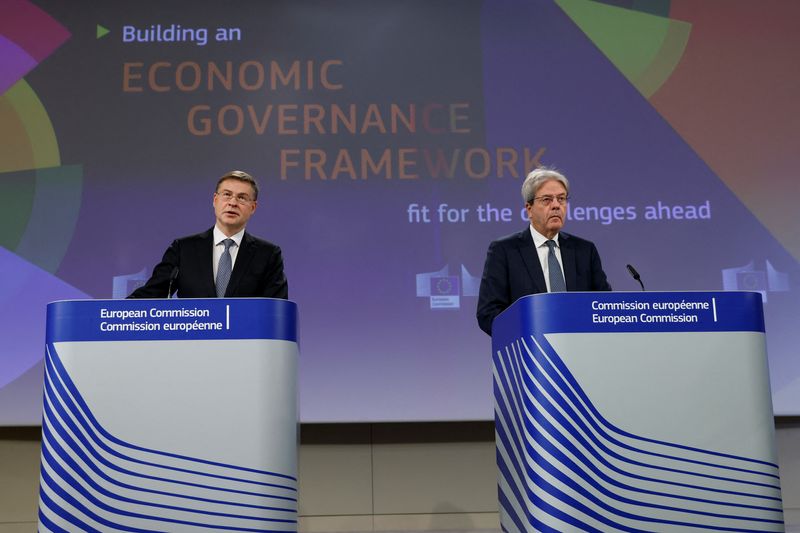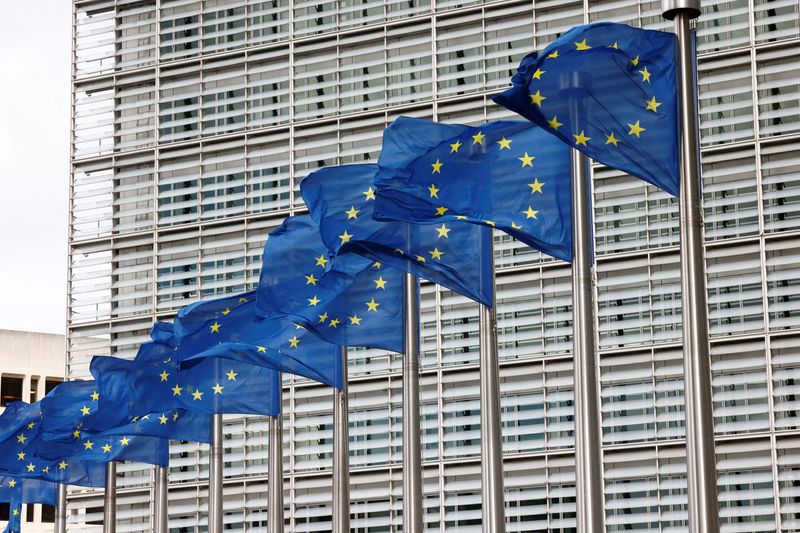By Jan Strupczewski
BRUSSELS (Reuters) -The European Commission proposed on Wednesday to change the EU's fiscal rules so that governments would negotiate debt reduction paths of a length linked to reforms and investments, but some members including Germany remain sceptical.
The change, which would move away from the current one-size-fits-all obligation of annual debt cuts of 1/20th of the excess above 60% of GDP, is meant to make governments "own" their debt plans, rather than see them as externally imposed by Brussels.
But some EU capitals, notably Berlin, fear that longer and individually negotiated debt reduction paths would encourage governments to postpone difficult decisions to near the end of the time frame or even until after their mandates expire.
Still, the changes are needed because a surge in public debt in European Union countries resulting from measures to support households and businesses through COVID-19 has left existing debt reduction requirements looking unrealistically ambitious.
"We are aiming for a simpler system of fiscal rules, with greater country ownership and more latitude for debt reduction – but combined with stronger enforcement," Commission Vice President Valdis Dombrovskis told a news conference.
Another key change proposed by the executive Commission is a focus on net primary spending - government expenditure that excludes debt interest - which is directly observable during the year and under government control.
That would address many governments' long-standing complaint that the current rules focus on a country's structural deficit - a complex, calculated indicator that is not directly observable and prone to strong revisions.
The Commission's ideas will now be debated with EU governments and, later, with the European Parliament, with the aim of changing EU law before the end of next year.
INDIVIDUAL DEBT REDUCTION PATHS
The Commission proposed that countries would as a rule have four years to put debt on a robust downward path through an appropriate setting of net primary expenditure every year.
This would ease the burden of quick adjustment on countries like Italy, which has a public debt of 148% of GDP, or Greece with 186%.
While high debt countries would be expected to put in more effort than those with moderate debt, the four years could be extended to seven if justified by investment in areas that are a priority for the EU, like fighting climate change, or reforms that improve debt sustainability.
The inclusion of public investment is an important factor for a group of countries led by France and Italy. They argue that climate change, the digital transformation, demographics or boosting defence capabilities after Russia's invasion of Ukraine should merit special treatment.
Governments would still have to keep budget deficits below 3% of GDP and aim to bring debt below 60% of GDP as before.
There would still be disciplinary steps if they exceed the deficit ceiling or expenditure limits, with smaller, but swifter fines for breaches.
Stronger enforcement has been one of the key demands of the so-called "frugal" camp of mostly northern European countries led by Germany. But officials have said there was still strong scepticism to the Commission's ideas in Berlin.

Among the reasons for that is long-standing mistrust between EU governments and institutions, officials said, where the Commission is seen by some capitals as too lenient in applying the laws, of which it is the guardian.
In a reform of the EU rules in 2011, governments agreed to make fines for excessive deficits difficult to stop once the Commission proposed them. But despite its greater powers, the Commission never proposed any fines, even though it had straightforward cases when France, Spain or Portugal repeatedly broke agreed limits.
